MFN exemption: Analysis and Proposal
May 2001
1. Introduction
Approximately 400 MFN exemptions are listed in the Annex on Article II Exemptions to the General Agreement on Trade in Services. The MFN principle is one of the most important pillars for realizing trade liberalization in a multilateral framework and is one of the most fundamental principles of the WTO Agreement. Thus, an MFN exemption is a deviation from this important principle. The Annex on Article II Exemptions specifies the condition that are exempt from obligations under paragraph 1 of Article II, such as, "in principle, such exemptions should not exceed a period of 10 years", or "in any event, they shall be subject to negotiation in subsequent trade-liberalizing rounds". Bearing this in mind, the MFN exemptions are subject to the current services negotiations pursuant to paragraph 6 of the Guidelines and Procedures for the Negotiations (S/L/93), and their elimination and reduction should be one of the most important topics of discussion in order to progressively achieve a higher level of liberalization. Japan stated in its proposal (S/CS/W/42) submitted in December 2000, that it shares with other Members, for example Hong Kong, China (S/CS/W/6), the idea of eliminating all registered MFN exemptions by the end of 2004, or at the conclusion of the current negotiations, whichever comes earlier.
Meetings on MFN exemption review were held last year as ad hoc sessions of the Council for Trade in Services. These have enabled us to exchange background information on the registered measures, including the conditions that created the need for the exemptions at the outset. We are very much in favor of promoting further the on-going process to follow up these discussions. The results of the MFN exemption review, and the subsequent discussions, should be effectively used during the future negotiations regarding the elimination and reduction of MFN exemptions.
This paper provides a basic analysis of all registered MFN exemptions based on data compiled on a country and sector basis, thereby allowing a common understanding among Members. Based on the findings of this analysis, Japan proposes that developed countries take the initiative to reduce their exemptions during the preparation process leading up to the negotiations on eliminating and reducing MFN exemptions. All the details of this analysis are based on the Secretariat note (Job 1551).
2. Country share of registered exemptions.
Of the total 401 MFN exemptions registered with the WTO, we have included only 331 in our analysis. The remaining exemptions, relating to maritime transport (63 measures) and to the accounting rates of telecommunications (7 measures), have been excluded from this analysis. The reason for excluding (1) maritime transport is that the negotiations in this sector have been suspended, and also that the MFN obligation described in both ArticleIIand the Annex on Article II Exemptions, has not been applied to any Member unless it has made specific commitment. The analysis of this sector will can possibly be conducted after the conclusion of the current service negotiations, or (2) the accounting rates of telecommunications is that the MFN obligation in this sector has neither been applied, in accordance with the understanding on the accounting rates in telecommunications reached during the negotiations on basic telecommunications.
By classifying all Members into 5 groups according to the amount of their registered measures, we find that merely 13% of Members (17 Members) have registered 51% of all registered MFN exemptions. Thus we note that a large proportion of the total exemptions are registered by only a limited number of Members.
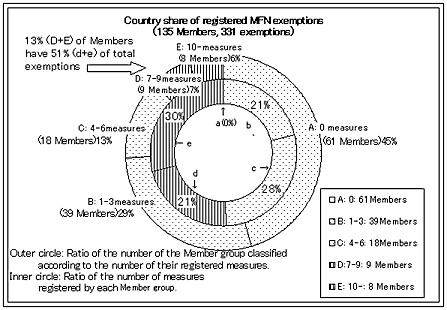
3. Classification of registered exemptions according to the stage of economic development
By dividing the Members into developed, developing and least-developed countries (based on the World Bank classification), and examining their usage of MFN exemptions we have found that developed countries, accounting for 36% of the number of Members, have registered 47% of the measures, while developing countries, accounting for 53% of the total number of Members, have registered 45% of the exemptions.
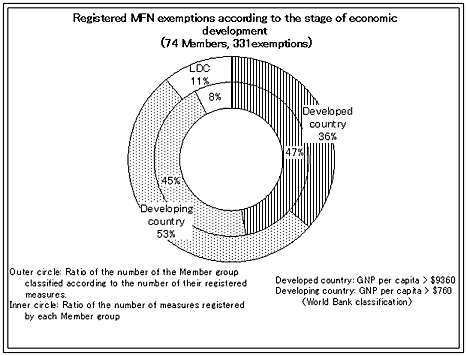
Significantly, those countries with more than 7 exemptions are mostly developed countries. Developed countries, which account for 64% of the Members, have registered 68% of the exemptions.
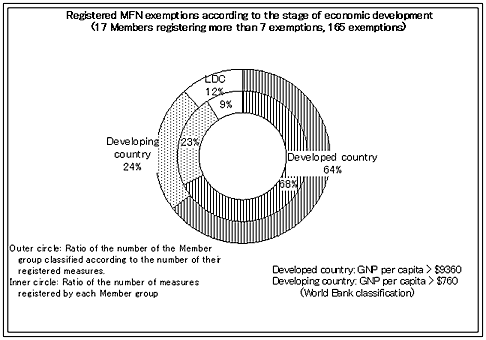
(Reference)
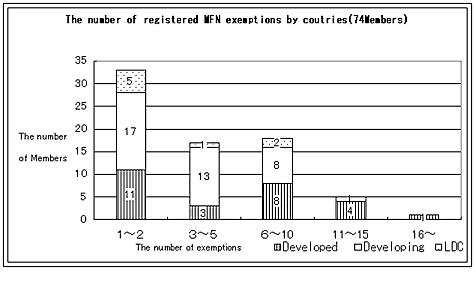
4. Classification of registered exemptions by sector
There are 75 cross-sectoral exemptions and many of them relate to either the movement of natural persons (VISA requirements, etc.), or to investment (purchase of real estate, preferential measures, etc.).
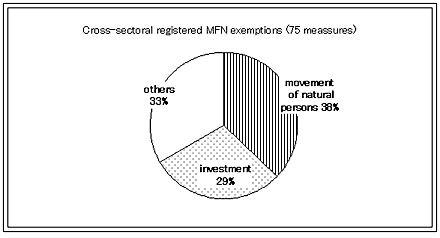
With regard to single-sectoral registered MFN exemptions (258 exemptions), many of them relate to audiovisual services (29%), financial services (20%) and road transport services (17%).
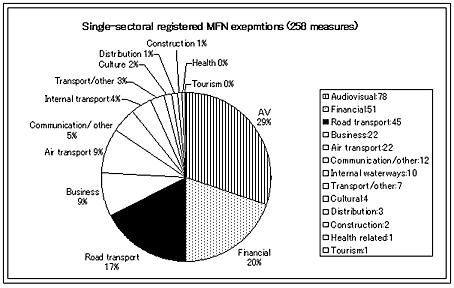
By dividing the Members into 6 geographic regions, and examining their use of exemptions within the above mentioned 3 sectors, the following results can be seen below.
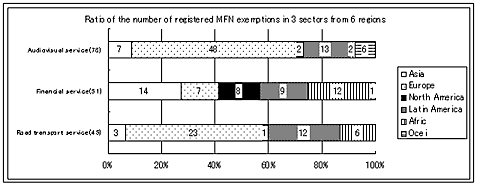
5. Conclusion
As shown in the above analysis, MFN exemptions are not equally registered by all Members. Rather, only a handful of Members occupy a large proportion of their total exemptions. Thus, to achieve our goal of eliminating MFN exemptions, it is indispensable for Members to seriously endeavor to reduce them.
In view of advancing the current services negotiations, it is not appropriate for developed countries to maintain the total number of MFN exemptions registered, especially since they are expected to set an example by opening their large markets to all Members, including developing Members. Thus, in order to achieve further liberalization in the future, in cooperation with developing Members, developed countries with many exemptions should take the initiative to reduce their exemptions as much as possible.
Japan has already proposed that all registered MFN exemptions should be eliminated by the end of 2004, or at the conclusion of the current negotiations, whichever comes earlier. So as a first step in realizing this goal, developed Members should eliminate by the end of 2001 all MFN exemptions that only have a nominal significance and have never been applied in reality. Furthermore, developed countries should endeavor to eliminate as early as possible those MFN exemptions which have real implications and which are currently in use, preferably by the end of 2002.
Back to Index
